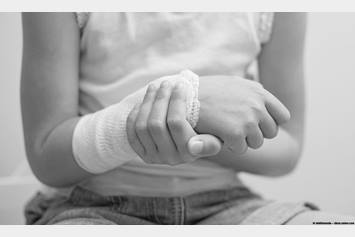Von Willebrand Disease
Von Willebrand Disease is a blood disorder where blood doesn’t clot well. It can cause easy bruising and nosebleeds.
What Is Von Willebrand Disease?
Von Willebrand disease (VWD) is a lifelong bleeding disorder passed down from parents (inherited) through genes. With VWD, bleeding lasts longer than normal because it’s harder for blood to clot.
There is no cure for VWD, but there are treatments for some symptoms.
What Are the Symptoms of Von Willebrand Disease?
- Nosebleeds that happen often and may be hard to stop.
- Bleeding gums from brushing teeth or flossing.
- Bleeding from injuries, shots (injections), or invasive procedures.
- Heavy menstrual periods.
- Blood in pee (urine) or poop (stool). This is rare.
How Is Von Willebrand Disease Diagnosed?
To diagnose VWD, your child may:
- Have blood tests.
- Have von Willebrand testing to see which type of VWD they have.
- Need to be tested again if they have mild or moderate VWD.
Types of VWD
- Type 1 – You make a normal VW protein, just not enough.
- Type 2 – You make a VW protein that doesn’t work right.
- Type 3 – You don’t make a VW protein.
Treatment
Treatment depends on your child’s symptoms and the type of VWD they have. They may be prescribed:
- Desmopressin (DDAVP®) – A nasal spray that increases the von Willebrand and factor VIII (8) to help stop bleeding.
- Humate-P® and VONVENDI® – Two different blood-clotting factors to treat extra bleeding in emergencies or before surgery. It is given by IV through a vein.
- Aminocaproic acid (Amicar®) and tranexamic acid (Lysteda®) – This medicine slows down bleeding. It keeps blood clots in the injured area from dissolving.
Safety
- Do not give your child aspirin, ibuprofen (Motrin®, Advil®), or naproxen (Aleve®, Naprosyn®). These may make bleeding worse.
- Only give acetaminophen (Tylenol®), meloxicam (Mobic®), or celecoxib (Celebrex®) for pain or fever.
- Check the label on over-the-counter cold, flu, and pain medicines. These may contain aspirin or ibuprofen.
- Tell your child’s doctor, health care provider, or blood doctor (hematologist) if they’re using herbal remedies or over-the-counter medicines.
- Contact the hemophilia center if your child needs surgery or dental work.
- Your child should get vaccines recommended by their doctor or health care provider.
- Check with your child’s hematologist before they start any sports or intense activities.
- Have your child wear medical identification (ID). This can be a bracelet, necklace, or sports band. This lets others know about their condition in emergencies.
When to Call the Doctor
Call your child’s doctor, health care provider, or hematologist if they have:
- Been hit hard on their head or neck.
- Nosebleeds that last more than 15 minutes or happen more often.
- Small cuts that bleed for more than 15 minutes or are not controlled.
- Menstrual periods that are heavier than normal or last more than 7 days, or if they’re passing clots bigger than a quarter.
- Bleeding from the mouth, lips, or gums that lasts more than 15 minutes after applying pressure and ice.
- Blood in their pee (urine) or poop (stool).
- A procedure, surgery, or dental work scheduled.
- Any side effects that aren’t getting better.
- Signs or symptoms of iron deficiency like headaches, pale skin, dizziness, or craving unusual foods, like ice chips or clay.
- Swollen, tender, warm, painful, or stiff joints.
- Severe back pain.
- A raised bump under the skin.
Other Information
- Tell anyone watching your child that they have VWD and what signs to watch for. This includes family, babysitters, coaches, and school staff.
- Your child should see a hematologist each year.
- Call your child’s doctor, health care provider, or hematologist for any questions.
Helping Hands™ Patient Education Materials
Helping Hands™ are easy-to-read guides about different illnesses, therapies, surgeries, and more. They’re created by the Patient Education team at Nationwide Children’s Hospital and are reviewed and approved by clinical staff, like nurses, doctors, pharmacists, and psychologists. Nationwide Children's Hospital is not responsible for misuse of information in patient education materials, including Helping Hands.
HH-I-175 | ©1993, revised 2025, Nationwide Children’s Hospital


